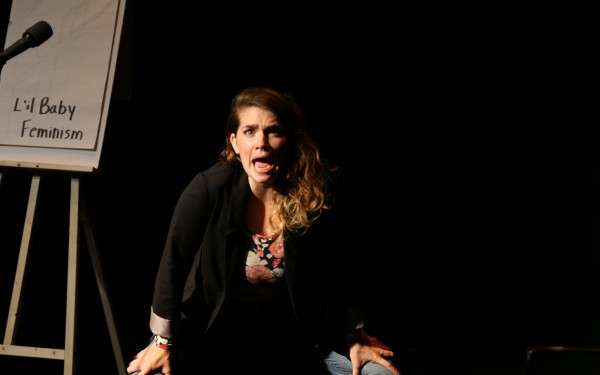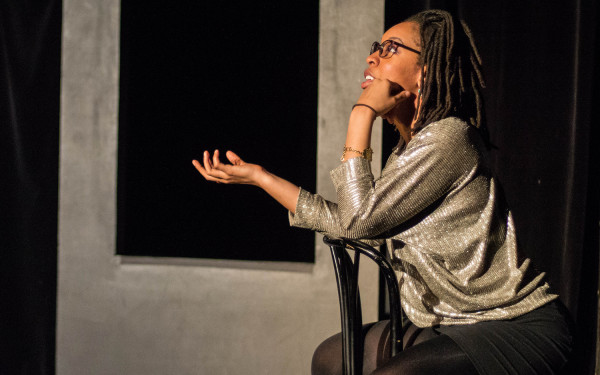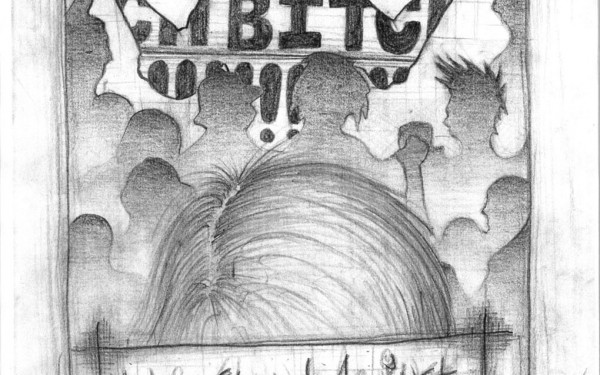Laughter That Empowers
Using the Stand-Up Stage to Centre the Marginalized
Using comedy as a mean of expression for those affected by oppression might not be intuitive, but on Friday, Sept. 16, the Centre for Gender Advocacy proved that it woks.
The Feminist Stand Up Comedy Night, organized by the centre, provided an open space for women, queer people and people of colour to laugh away their experiences with oppression onstage.
The evening took place at Reggie’s, Concordia’s downtown campus bar. It featured eight artists, including six open-mic performers and two full-time stand-up comedians: Ify Chiwetelu and Kalyani Pandya.
“There is a demand not only for feminist comedy which mainly focuses on gender empowerment but also the need for anti-oppressive humour more broadly,” said the centre’s action coordinator Stacey Gomez.
Comedy as a medium happens to be an increasingly important tool for social justice, with burgeoning feminist and alternative comedy both inside and out of Canada. Retaking the stage, and feeling that you deserve the space you take, can still be a long and painful process for women, queer, non-binary people and people of colour.
Reaching Out to the Audience
On Friday, Reggie’s became the safe space it aims to be. Everyone was welcome and encouraged to come laugh and witness the artists’ perspectives.
“It was a precious night. The audience has a very similar positioning. They understand the material, they are politically savvy,” Pandya reflected. “It’s a handpicked audience.”
Sometimes though, reaching out is more difficult.
“Not everyone is your audience, but you can still try to win over people who may not have considered laughing about it,” Chiwetelu explained. “Comedy allows people to not necessarily have their guard up.”
Talking about social justice on stage also has its pitfalls. Finding a balance between getting people to laugh and not compromising one’s voice is a tricky experience.
“I certainly don’t want to get to the point where I’m re-inscribing sexism, inequality or homophobia to get the laugh,” Pandya said. Both Pandya and Chiwetelu expressed the importance of being aware of the possibility that a marginalized audience could feel downplayed by seemingly witty wordplay.
Under the Spotlight
The comedy field is not different from other oppressive spaces. Misogyny and sexism can seep in and influence it.
“We want to open the space to people of different communities for them to bring their perspectives and challenge discrimination,” Gomez said.
A 1998 study from the scholarly journal Sex Roles actually found that the enjoyment of sexist humour was positively correlated with both psychological and physical aggression in men. Opening the stage to a variety of comedians with different stories and sensibilities was the event’s goal.
While content matters, Chiwetelu argues that “sometimes, even just the act of taking space can be political,” even when the artist showcases a type of humour that has nothing to do with social justice.
Empowerment
“In my own experience, those who had the toughest experience are the ones who have the greatest sense of humour. It helps us to be resilient,” said Gomez.
From weird dating experiences to parents’ homophobia and cultural appropriation, performers voiced the hardships of their lives, while successfully putting a funny spin on it.
“It is so empowering to talk about the crap that happened with other people going through the same crap”, said Pandya. “Getting my own voice and being okay with the fact that my humour is going to be feminist and probably lesbian feminist as well as antiracist was key in this process.”

1web_900_676_90.jpg)


2_600_375_90_s_c1.jpg)


